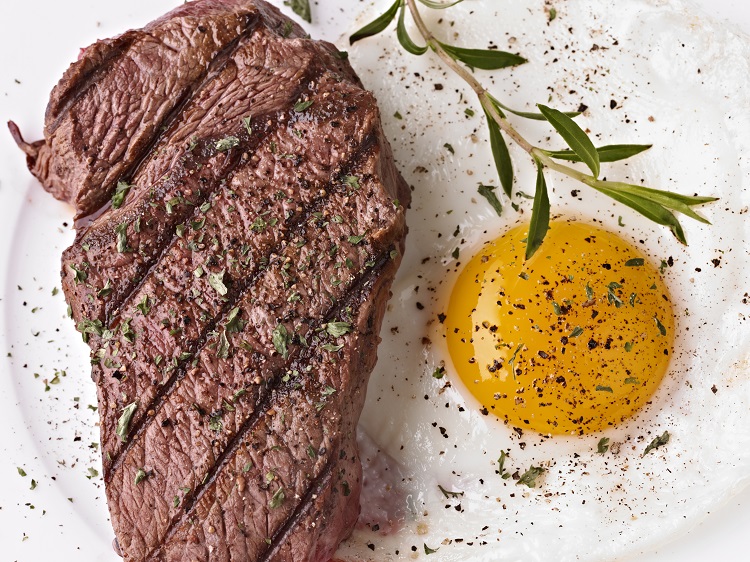Food
The ketogenic diet, a diet consisting of very few carbs and high fat in order to encourage the body to instead burn fat for energy, has been linked to a range of health benefits in the past.
For example, one study linked it to improved brain health, while another suggested it could mitigate early Alzheimer’s symptoms. It has also been linked to reduced blood sugar and lowered blood pressure.
However, not everything is rosy in the world of keto. A new study, published in the journal Cell Reports Medicine, suggests that following a ketogenic diet could, in fact, be bad for gut bacteria, reducing ‘friendly’ bacteria, as well as raising cholesterol levels and decreasing glucose tolerance.
Discovering the effects of a ketogenic diet
The study’s 53 participants followed either a moderate sugar diet (the control group), a low-sugar diet (fewer than 5% of calories from sugar) or a ketogenic diet (fewer than 8% of calories from carbohydrates). The study hypothesised that these restrictions would reduce physical activity, which they did not. They did, however, alter body composition.
In contrast to the low-sugar diet, which was found to significantly reduce cholesterol levels, the ketogenic diet actually increased cholesterol. The diet increased apolipoprotein B (apoB), which causes plaque to build up in the arteries.
According to lead researcher Dr. Aaron Hengist, the increase in ‘unfavourable fats’ in the blood has the potential to increase the likelihood of heart attack and stroke if sustained over years.
Bifidobacteria
Bifidobacteria is a beneficial gut bacteria often found in probiotics and functional foods. Its benefits include producing b vitamins, inhibiting pathogens and harmful bacteria, and lowering cholesterol.
The diet also reduced beneficial gut bacteria, such as Bifidobacteria, which is often found in probiotics. Sugar restriction, on the other hand, did not. According to researcher Dr. Russell G. Davies, this could potentially lead to an increased risk of intestinal infection, digestive orders such as irritable bowel syndrome, and a weakened immune system.
The keto diet also reduced glucose tolerance, which meant that the body was less efficient at handling carbohydrates. According to Professor Javier Gonzalez, who oversaw the research, such low glucose tolerance, while not a risk to those who continue to follow a ketogenic diet, could increase the likelihood of developing type-2 diabetes to those who switch back to a high-carb diet.
In some respects, the keto diet was more successful than the sugar reduction diet. For example, the keto diet resulted in 2.9kg of fat loss over the 12 weeks of study, while for the sugar reduction diet it was only 2.1kg.
Ketogenic diet: Ketones and ketosis
Ketones are a chemical produced by the liver as it breaks down fats, and which the body uses for energy during long periods of exercise, periods of fasting, or when it does not have access to carbohydrates. When you follow a ketogenic diet, it produces ketones in the blood. A ketogenic diet leads to ketosis, which is when the body breaks down stored fat in order to convert it into energy.
In the end, the researchers suggested that a low-sugar diet is better than the riskier ketogenic diet for most people.
The study was funded by the Rank Prize Funds, with input from Ian Tarr, the University of Bath, and Cosun Nutrition Center (the nutritional arm of Dutch agricultural cooperative Cosun).
How does keto reduce friendly gut bacteria?
According to Russell G. Davies, the reduction of fibre consumption in a ketogenic diet, to 15g a day, around half of the UK’s daily recommended amount, is what leads to the reduction of Bifidobacteria. Bifidobacteria, he said, need fibre to survive.
How does keto raise cholesterol levels?
Bifidobacteria is often linked to lower cholesterol levels. The study speculates that the reduction of Bifidobacteria may in turn lead to the increase in levels of cholesterol.
“The increase in cholesterol with low-carb diets is likely to be due to a combination of both the high (saturated) fat intake, and the ketosis itself. We know from other studies that these two factors can independently increase the amount of lipoproteins that contain cholesterol,” Javier Gonzalez told FoodNavigator.
“It is mostly thought that this is due to a reduction in the clearance of these lipoproteins by the liver but it could also be due to increased production of these lipoproteins too.”
How does the keto diet reduce glucose tolerance?
According to the study, the reduction of GLUT4, a glucose transporter, by the ketogenic diet has a role in reducing glucose tolerance in those following a ketogenic diet.
According to Javier Gonzalez, the reduction of glucose tolerance found in followers of the ketogenic diet is likely an adaptive response to consuming fewer carbohydrates.
Sourced From: Cell Reports Medicine
‘Ketogenic diet but not free-sugar restriction alters glucose tolerance, lipid metabolism, peripheral tissue phenotype, and gut microbiome: RCT’
Published on: 5 August 2024
Doi: https://doi.org/10.1016/j.xcrm.2024.101667
Authors: A. Hengist, R. G. Davies, J. Walhin, J. Buniam, L. H. Merrell, L. Rogers, L. Bradshaw, A. Moreno-Cabañas, P. J. Rogers, J. M. Brunstrom, L. Hodson, L. J.C. van Loon, W. Barton, C. O’Donovan, F. Crispie, O. O’Sullivan, P. D. Cotter, K. Proctor, J. A. Betts, F. Koumanov, D. Thompson, J. T. Gonzalez
